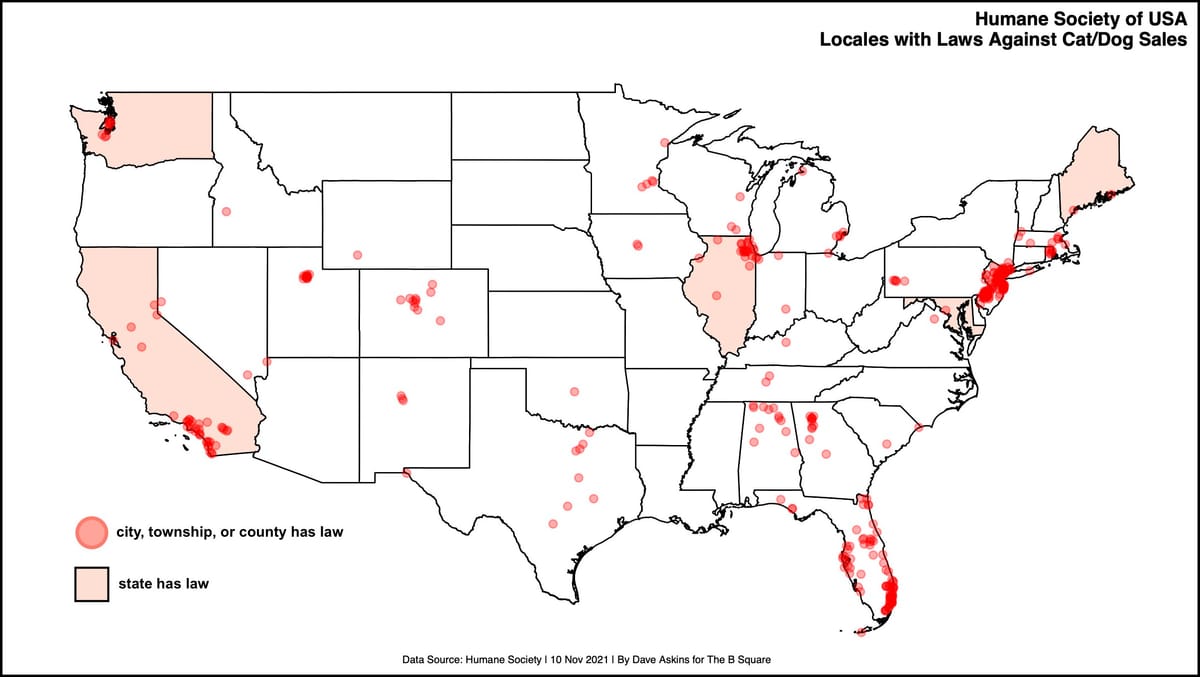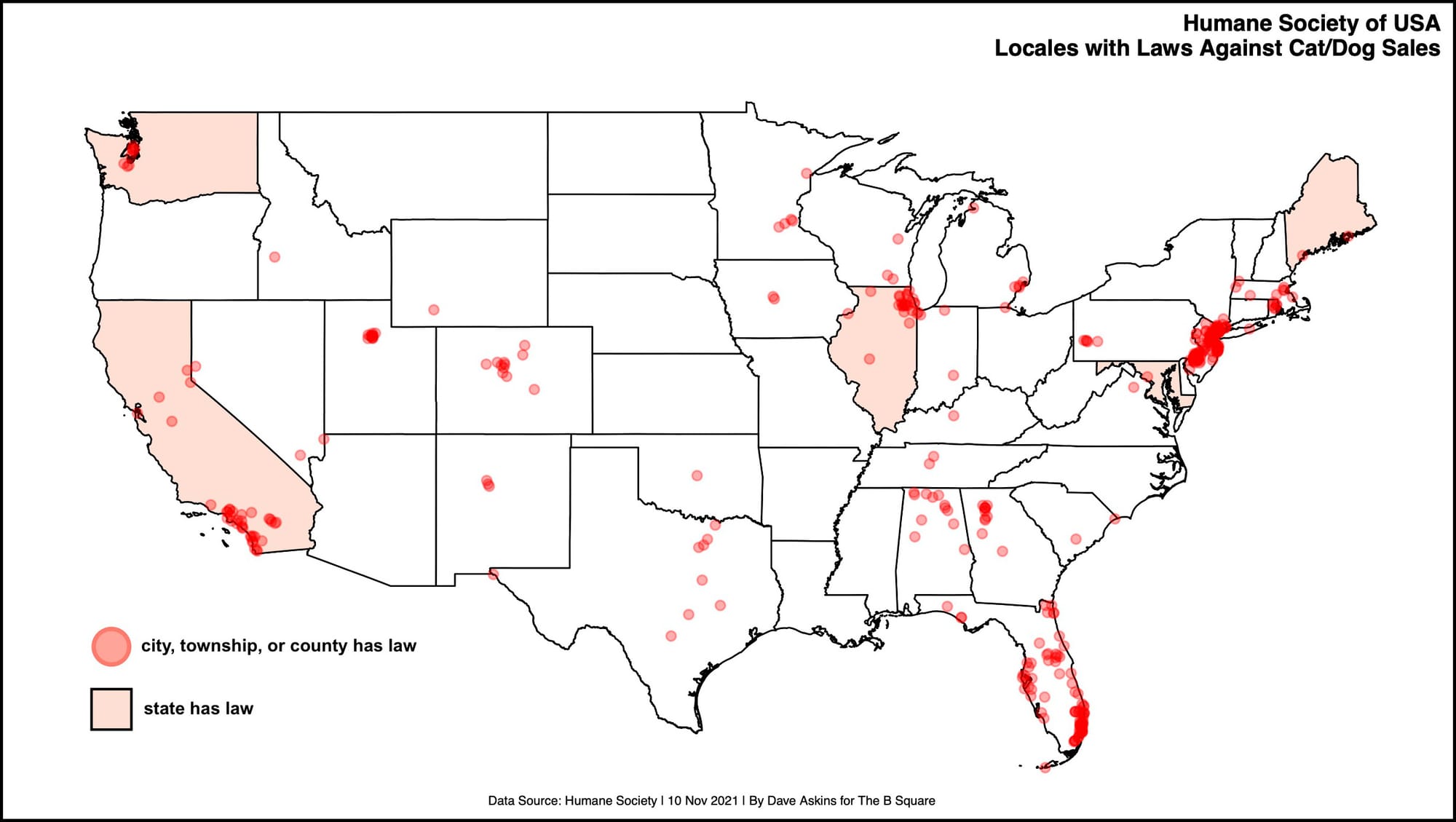Possible new Bloomington law banning pet shop sale of cats, dogs would add to national momentum



Bloomington’s animal control commission voted unanimously on Monday to support a proposed new ordinance banning the sale of cats and dogs.
If the new ordinance is enacted by the city council, then starting in about a year, on Jan. 1, 2023, pet shops inside the city limits of Bloomington would not be able to sell dogs or cats.
Bloomington’s city council is supposed to hear the ordinance for a first reading at its meeting next week, on Nov. 17. The ordinance is being put forward by councilmembers Susan Sandberg, Dave Rollo, and Isabel Piedmont-Smith.
The two Bloomington stores that would be impacted by the new law are Delilah’s Pet Shop on West Third Street and Anthony’s Pets in College Mall.
The idea of the ordinance was not controversial for animal control commissioners—they’d already been looking for movement in that direction. As animal commission president Valerie Peña put it: “Absolutely thrilled to see this. It has been a long time coming and it’s great news.”
The idea behind the new local law is to reduce the consumer demand for animals that is currently met by puppy and kitten mills—operations that put volume ahead of animal welfare.
According to the Humane Society of the United States (HSUS), most of the dogs and cats sold in pet shops are sourced from puppy and kitten mills.
Indiana’s state director for HSUS, Samantha Morton, appeared on the Zoom video-conference call for Monday’s animal control commission meeting.
The approach of prohibiting sale of dogs and cats in pet stores is part of a strategy meant to have two effects: reduce the number of animals that local animal shelters have to take in; and help put puppy and kitten mills out of business.
In a phone interview with The B Square, Morton stressed that the goal behind legislation like Bloomington’s, which the Humane Society supports nationwide, is not to force local pet shops to close down. Morton said, “There’s no intent to put local shops out of business.”
Morton added that the Humane Society has a program to work with pet shops to transition them to a “humane business model”—that relies on pet supplies, pet food, and services, like grooming.
A business model that does not rely on sale of animals will still be profitable, Morton said. “The pet supply and food and grooming industry is a $103-billion industry. We know that these stores are successful, and they can operate successfully without selling puppies,” Morton said.
The proposed ordinance explicitly allows for a pet store to display animals for adoption from a local municipal shelter or a rescue organization. But under the proposed ordinance, the pet store can’t receive a piece of the adoption fee or get other direct financial compensation. Morton says a significant benefit to a pet shop would come from the walk-in customer traffic that the presence of animals brings.
Bloomington already has an ordinance that regulates pet stores as “commercial animal establishments.” One of the requirements of Bloomington’s existing ordinance is that inspection be allowed by Bloomington’s animal control officers.
Under Bloomington’s current ordinance, Bloomington pet shops have to keep records of the name, address and telephone number of the breeder and seller of each animal for two years after the animal is sold. The pet shop also has to make those records available for inspection by Bloomington’s animal care and control department.
Doesn’t that existing authority give Bloomington the ability to ensure that local pet shops are not sourcing their animals from kitten and puppy mills? Morton pointed out that Bloomington has jurisdiction only over the dogs in a pet store, not necessarily over the place over where the breeder is located, if it’s outside of Bloomington.
Morton said, “We tell localities that they can have a piece in making their community more humane, if these animals are not coming into their community from these puppy mills. And they do have control over their own community, whereas they don’t have control over where that breeder is.”
Morton added that the strategy of reporting a pet shop animal source to an entity that does have authority, like the USDA, would probably not be effective. “The USDA standards are just really truly nothing better than survival standards,” Morton said.
Breeders themselves would not be impacted by the new ordinance. A pet shop is defined as a “retail establishment”—so a breeder would fall outside that definition.
Some of the recent movement by Hoosier localities to enact pet shop ordinances stems from a state law in Illinois, which was approved this year, effective in February 2022. The new Illinois law has caused some Illinois pet stores to relocate across state lines into Indiana.
Indiana localities that have passed ordinances prohibiting the sale of cats and dogs by pet stores include: St. Joseph County, Columbus, Dyer, Highland, and Crown Point. The last four on that list passed the laws in 2021.
If the city council approves the new ordinance, which seems likely, Bloomington would be joining over 400 localities across the country that have passed similar legislation. Five states have laws on the books prohibiting dog and cat sales by pet stores: California, Maryland, Maine, Washington, and Illinois.
Indiana’s state legislature has a recent history of preempting local legislation in certain topic areas. In March 2016, House Bill 1053 was signed into law by then-governor Mike Pence. It prohibited local governments from restricting the manufacture, use, sale or distribution of plastic bags.
In her work as a lobbyist in the state of Indiana, has Morton not heard of any moves by the state legislature to preempt local pet shop regulation. Morton said, “I have not yet heard any rumblings that a preemption bill will be filed on this.” She added, “But it’s something that HSUS would actively oppose, because we see great momentum in the localities passing these types of ordinances.”
Instead of passing a local preemption bill, Indiana might follow the lead of Illinois and enact a state statute banning the retail sale of dogs and cats. Morton told The B Square a bill was introduced in the house during the 2021 session [HB 1142] by Representative Chris Campbell (D). That bill died in committee with no action.
Morton said she plans to work with Campbell to bring back a revised version of the bill for the 2022 session. Morton said, “One of the things that I’m hoping to do this year is to work with Representative Campbell to help get support on the Republican side for this issue—because we do know that animal welfare issues are largely bi-partisan issues.”
Could Bloomington’s new ordinance just prompt a pet shop to move across city lines to the unincorporated part of the county? President of Monroe County’s board of commissioners, Julie Thomas, told The B Square there had been no city-county communication on the topic of the pet shop ordinance.
But Thomas added that the topic of a county pet shop ordinance is something she imagines the commissioners will discuss in the near future.




Comments ()